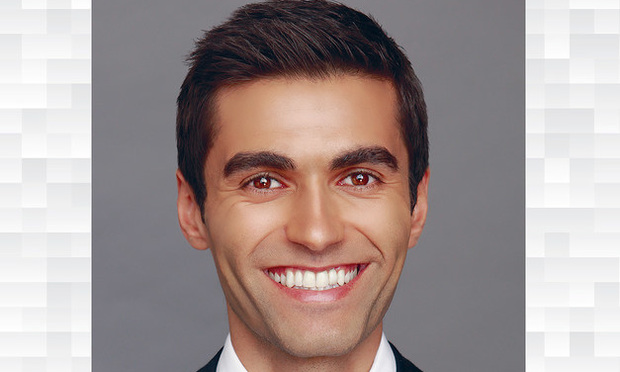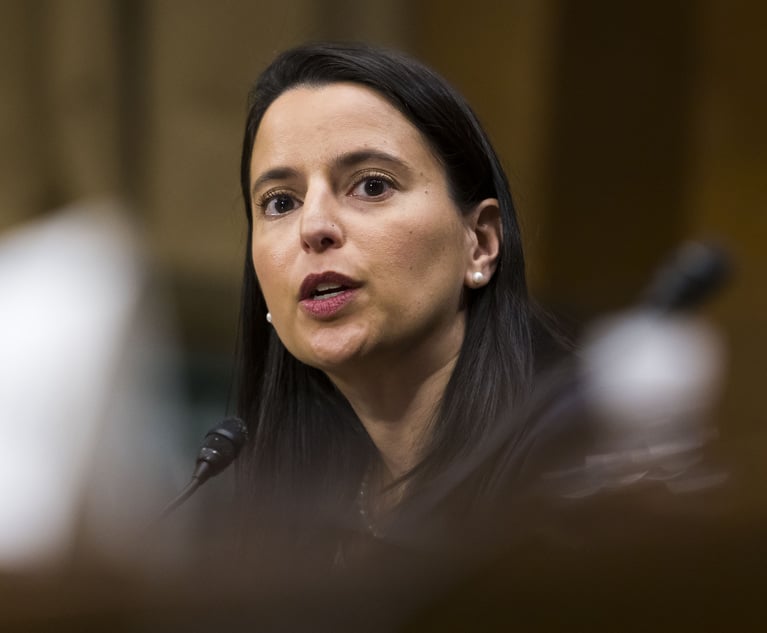Cannabis Registration Requirements May Be Unenforceable
Say you want to start a cannabis business. There's likely a law requiring you to register with the government. But can you refuse to comply with that law? Arguably, you can.
August 01, 2018 at 12:43 PM
7 minute read
 Dan Terzian of Duane Morris. Say you want to start a cannabis business. There's likely a law requiring you to register with the government. But can you refuse to comply with that law? Arguably, you can. You have a Fifth Amendment right not to be forced to incriminate yourself. And registration requirements force you to identify as a person involved in activities illegal under federal law.
Dan Terzian of Duane Morris. Say you want to start a cannabis business. There's likely a law requiring you to register with the government. But can you refuse to comply with that law? Arguably, you can. You have a Fifth Amendment right not to be forced to incriminate yourself. And registration requirements force you to identify as a person involved in activities illegal under federal law. Cannabis Registration Requirements
Participating in states' cannabis industries often requires registering with the state or local government. The exact registration requirement varies by jurisdiction and by activity. Some examples may help. Prospective medical marijuana cultivators in the District of Columbia must file an application with the government. In that application, the applicant must admit that they are violating federal law. Maybe you want to cultivate cannabis plants inside your home. If you're in Colton, you'll need to apply for a government permit. Or if you're in Nevada and want to use medical marijuana, you must register with the state government.Fifth Amendment Background
This privilege against self-incrimination is broad. It allows you to refuse to answer any question that involves “(1) compulsion, (2) a testimonial communication or act, and (3) incrimination.” (Important caveat: If the “you” here is a corporation, you don't have a Fifth Amendment privilege against self-incrimination.) The incrimination part here is easy. You can refuse to answer the government's questions whenever your answer “would furnish a link in the chain of evidence needed to prosecute” you. Federal law criminalizes cannabis activities. So an application for you to cultivate cannabis plants certainly links you to that. The testimonial communication part is more nuanced. To some extent, the Fifth Amendment does not apply to the production of required records. Meaning the required records exception allows the government to force “the production of records whose creation and maintenance is required as a condition of voluntarily engaging in a highly regulated activity.” On a technical level, the required records exception requires three things: (1) “the purposes of the [government's] inquiry must be essentially regulatory”; (2) “information is to be obtained by requiring the preservation of records of a kind which the regulated party has customarily kept;” and (3) “the records themselves must have assumed 'public aspects' which render them at least analogous to public documents.” With registration requirements, the required records exception should be irrelevant. The law doesn't require you produce existing records. It requires you to complete applications—creating documents that did not otherwise exist. For this reason, the U.S. Supreme Court has recognized that the required records exception does not apply (and the communication is testimonial) when the law “required simply … provid[ing] information, unrelated to any records which he may have maintained, about his … activities. This requirement is not significantly different from a demand that [you] provide oral testimony.” We're left with the question of compulsion. Is the government forcing you to register to enter the cannabis industry? Or is that your voluntary choice?Registration Requirements: Compulsory or a Choice
The Nevada Supreme Court ( Doe v. State of Nevada ) and the U.S. District Court for the District of Columbia ( Sibley v. Obama ) have both held that compelled registration is a voluntary choice. You can enter the cannabis industry and register. Or you can not enter the industry and not register. Because you have that choice, you can't claim a third option of entering the cannabis industry and not registering. Both courts' analyses hinged on a 1984 Supreme Court case, Selective Service System v. Minnesota Public Interest Research Group . There, the Supreme Court addressed a law that required student-applicants for financial aid to certify that they registered for the draft. The Supreme Court found this constitutional because the students weren't required to apply for financial aid. They could still go to university without it. The Nevada Supreme Court and the district court found the cannabis registration laws were basically the same thing as Minnesota Public Interest 's financial aid law. You can choose not to participate in the state's cannabis industry, so you're not being forced to register. Yet note the disconnect. Minnesota Public Interest involved students going to college. They could still attend college whether or not they applied for financial aid (theoretically, at least). In that sense, the financial aid law was a not a de jure requirement to attending college. Not so with the cannabis registry laws. If you want to cultivate a cannabis plant, you must register. Another Supreme Court case—one not considered by the Nevada Supreme Court and the district court—gives real weight to the argument that you have a Fifth Amendment right not to comply with cannabis registration requirements. Marchetti v. United States involved a law requiring that certain gamblers register with the government. The Supreme Court found the law unconstitutional because gambling was largely illegal. So there was a real danger that registration equaled self-incrimination. There's more. The Supreme Court recognized that an earlier decision reached a contrary result. That earlier decision found the Fifth Amendment did not apply because “the gambler need not register or pay the occupational tax if only he elects to cease, or never to begin, gambling.” Close readers will note this is essentially the reasoning of the Nevada Supreme Court and the district court: You need not register for the cannabis activity if you elect to never begin that activity. Marchetti rejected this line of reasoning, calling it “no longer persuasive.” Those challenging registration requirements should focus on Marchetti . Arguably, the Nevada Supreme and the district court decisions should be disregarded because they relied on Minnesota Public Interest —which isn't on point because the financial aid law did not require registration to participate in the industry (getting an education). Contrast that with Marchetti , which seems more on point. Both the cannabis and gambling registries involve persons who want to (or are) participating in an industry. And both involve laws that require registration to participate in that industry. Dan Terzian is an associate at Duane Morris and practices in the area of litigation.This content has been archived. It is available through our partners, LexisNexis® and Bloomberg Law.
To view this content, please continue to their sites.
Not a Lexis Subscriber?
Subscribe Now
Not a Bloomberg Law Subscriber?
Subscribe Now
NOT FOR REPRINT
© 2025 ALM Global, LLC, All Rights Reserved. Request academic re-use from www.copyright.com. All other uses, submit a request to [email protected]. For more information visit Asset & Logo Licensing.
You Might Like
View All
Judge Accuses Trump of Constitutional End Run, Blocks Citizenship Order
3 minute read
Chicago Law Requiring Women, Minority Ownership Stake in Casinos Is Unconstitutional, New Suit Claims
5 minute read
Trending Stories
Who Got The Work
J. Brugh Lower of Gibbons has entered an appearance for industrial equipment supplier Devco Corporation in a pending trademark infringement lawsuit. The suit, accusing the defendant of selling knock-off Graco products, was filed Dec. 18 in New Jersey District Court by Rivkin Radler on behalf of Graco Inc. and Graco Minnesota. The case, assigned to U.S. District Judge Zahid N. Quraishi, is 3:24-cv-11294, Graco Inc. et al v. Devco Corporation.
Who Got The Work
Rebecca Maller-Stein and Kent A. Yalowitz of Arnold & Porter Kaye Scholer have entered their appearances for Hanaco Venture Capital and its executives, Lior Prosor and David Frankel, in a pending securities lawsuit. The action, filed on Dec. 24 in New York Southern District Court by Zell, Aron & Co. on behalf of Goldeneye Advisors, accuses the defendants of negligently and fraudulently managing the plaintiff's $1 million investment. The case, assigned to U.S. District Judge Vernon S. Broderick, is 1:24-cv-09918, Goldeneye Advisors, LLC v. Hanaco Venture Capital, Ltd. et al.
Who Got The Work
Attorneys from A&O Shearman has stepped in as defense counsel for Toronto-Dominion Bank and other defendants in a pending securities class action. The suit, filed Dec. 11 in New York Southern District Court by Bleichmar Fonti & Auld, accuses the defendants of concealing the bank's 'pervasive' deficiencies in regards to its compliance with the Bank Secrecy Act and the quality of its anti-money laundering controls. The case, assigned to U.S. District Judge Arun Subramanian, is 1:24-cv-09445, Gonzalez v. The Toronto-Dominion Bank et al.
Who Got The Work
Crown Castle International, a Pennsylvania company providing shared communications infrastructure, has turned to Luke D. Wolf of Gordon Rees Scully Mansukhani to fend off a pending breach-of-contract lawsuit. The court action, filed Nov. 25 in Michigan Eastern District Court by Hooper Hathaway PC on behalf of The Town Residences LLC, accuses Crown Castle of failing to transfer approximately $30,000 in utility payments from T-Mobile in breach of a roof-top lease and assignment agreement. The case, assigned to U.S. District Judge Susan K. Declercq, is 2:24-cv-13131, The Town Residences LLC v. T-Mobile US, Inc. et al.
Who Got The Work
Wilfred P. Coronato and Daniel M. Schwartz of McCarter & English have stepped in as defense counsel to Electrolux Home Products Inc. in a pending product liability lawsuit. The court action, filed Nov. 26 in New York Eastern District Court by Poulos Lopiccolo PC and Nagel Rice LLP on behalf of David Stern, alleges that the defendant's refrigerators’ drawers and shelving repeatedly break and fall apart within months after purchase. The case, assigned to U.S. District Judge Joan M. Azrack, is 2:24-cv-08204, Stern v. Electrolux Home Products, Inc.
Featured Firms
Law Offices of Gary Martin Hays & Associates, P.C.
(470) 294-1674
Law Offices of Mark E. Salomone
(857) 444-6468
Smith & Hassler
(713) 739-1250







